![star trek 3 song Star Trek III: The Search for Spock [Original Soundtrack]](https://rovimusic.rovicorp.com/image.jpg?c=mNEMea75CQPTkdJ9DBRpcz6KsMttLlyBmmVTZ6_CLs0=&f=4)

Star Trek III: The Search for Spock [Original Soundtrack]
James horner.
STREAM OR BUY:
Release Date
Discography timeline, allmusic review, user reviews, track listing, similar albums, moods and themes.
Spotify is currently not available in your country.
Follow us online to find out when we launch., spotify gives you instant access to millions of songs – from old favorites to the latest hits. just hit play to stream anything you like..
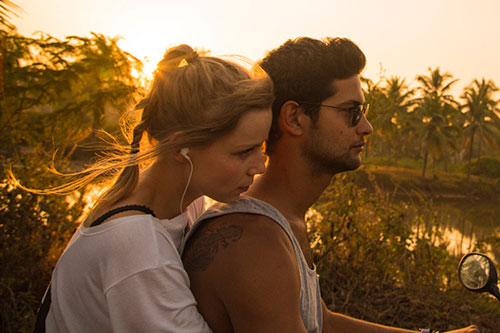
Listen everywhere
Spotify works on your computer, mobile, tablet and TV.

Unlimited, ad-free music
No ads. No interruptions. Just music.

Download music & listen offline
Keep playing, even when you don't have a connection.
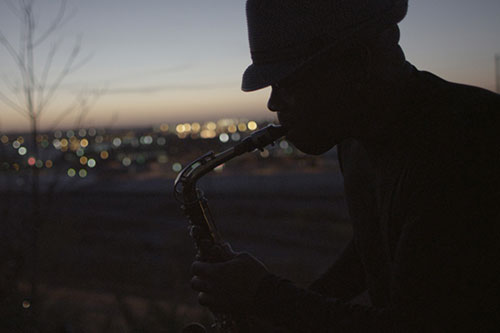
Premium sounds better
Get ready for incredible sound quality.

Theme from Star Trek
- View history
The "Theme from Star Trek " (originally scored under the title "Where No Man Has Gone Before" [1] and also known informally as the " Star Trek Fanfare ") is the instrumental theme music composed for Star Trek: The Original Series by Alexander Courage . First recorded in 1964 , it is played in its entirety during the opening title sequences of each episode. It is also played over the closing credits, albeit without its signature opening fanfare.
During the opening credits, the theme's opening fanfare is accompanied by the now-famous "Space: the final frontier" monologue spoken by William Shatner (with the exception of the pilot episodes, " The Cage " and " Where No Man Has Gone Before "). Throughout the opening credits, the theme is punctuated at several points by the USS Enterprise flying towards and past the camera. These "fly-bys" are accompanied by a "whoosh" sound effect created vocally by Courage himself. (Documentary: Music Takes Courage: A Tribute to Alexander Courage )
- 1 Conception and original use
- 2 Vocalization and lyrics
- 3 Later use
- 4 Other recordings and uses
- 5 External link
Conception and original use [ ]
Creator Gene Roddenberry originally approached composer Jerry Goldsmith to write the theme for Star Trek . Goldsmith, however, had other commitments and instead recommended Alexander Courage. ( Star Trek: The Motion Picture (The Director's Edition) commentary)
Courage was not a science fiction fan, referring to the genre as "marvelous malarkey." He thus saw the theme he was writing as "marvelous malarkey music." Courage composed, orchestrated and conducted the theme in one week. He drew inspiration from a Richard A. Whiting song he heard on the radio as a child called "Beyond the Blue Horizon". This song had a drawn-out tune with a steady, fast-paced beat underneath it, which Courage emulated when composing the theme. (Documentary: Music Takes Courage )
The theme used in " The Cage " – the unaired first pilot – featured a wordless melody line by soprano Loulie Jean Norman supported by electronic underpinnings. When a second pilot was ordered and the series was picked up, Norman's vocalizations were dropped from the theme.
The first season of The Original Series used two versions of the theme. On the original NBC and syndicated runs, five episodes – "Where No Man has Gone Before", the second pilot, along with " The Man Trap ", " Charlie X ", " The Naked Time ", and " Mudd's Women " – used a mixed electronic/orchestral arrangement for the opening credits, with the main melody line created electronically and accompanied by more traditional instrumentation, including a flute and an organ for both the opening and closing themes. When the series was remastered for video in the early 1980s, only "Where No Man Has Gone Before" retained this version of the theme over both the opening and closing credits, while the opening was restored to the other four episodes and placed on five others when the series was remastered again for DVD release. The closing credits for the other nine episodes, however, used a version that had only an orchestral arrangement. The mixed arrangement was first heard on " The Corbomite Maneuver " (the tenth episode aired, although it was the second episode produced), after which the show opened with the orchestral-only arrangement.
Vocalization and lyrics [ ]
For the second and third seasons , Loulie Jean Norman's wordless accompaniment was re-added to the theme. However, Norman's voice was made more prominent than it was for "The Cage".
When originally written (and as heard in "The Cage"), Courage had Norman's vocalizations and the various instruments mixed equally to produce a unique sound. According to Courage, however, Gene Roddenberry had it re-recorded with Norman's accompaniment at a higher volume above the instruments, after which Courage felt the theme sounded like a soprano solo. Roddenberry's version can be heard during the opening credits of each episode in the second and third seasons; Courage's version is heard during the closing credits.
Further souring the relationship between Roddenberry and Courage, Roddenberry wrote lyrics to the theme without Courage's knowledge – not in the expectation that they would ever be sung, but in order to claim a 50% share of the music's performance royalties. Although there was never any litigation, Courage commented that he believed Roddenberry's conduct was unethical, to which Roddenberry responded, " Hey, I have to get some money somewhere. I'm sure not going to get it out of the profits of Star Trek . " [2] Although the lyrics were never included on the series, they have been printed in several "TV Theme" songbooks over the years.
Later use [ ]
Portions of the Theme from Star Trek have been used in all 13 Star Trek feature films . Most of the Star Trek films' opening themes start by quoting the opening fanfare from Courage's theme, before seguéing into the film's own theme. However, there are multiple exceptions to this tradition. Star Trek: The Motion Picture did not use the fanfare at all in the opening or closing music, although a subdued version of the Theme from Star Trek was created by Courage at the request of the film's main composer, Jerry Goldsmith . [3] This arrangement of the theme was used for the " Captain's Log " cues. The theme was quoted again in Star Trek III: The Search for Spock and Star Trek IV: The Voyage Home , most extensively in the final scenes.
Star Trek VI: The Undiscovered Country , scored by Cliff Eidelman , broke with the tradition again. The Theme from Star Trek did not appear in the opening music, although it was used towards the end. Star Trek Generations , scored by Dennis McCarthy , on the other hand, did use the fanfare in the opening credits (and extensively throughout the score) but it did not appear until the end of the main title music.
The score for Star Trek , composed by Michael Giacchino , again did not use the fanfare in the opening title music: instead, Giacchino subtly quoted the opening notes and various other Star Trek themes from past films throughout his score. For the end credits, a re-arranged version of the Theme from Star Trek , fully orchestrated and with The Page La Studio Voices accompanying the melody line, was used. This version was also used for the end credits of Star Trek Into Darkness and Star Trek Beyond .
The theme's opening fanfare was adapted by Dennis McCarthy as the opening for the Star Trek: The Next Generation theme (the remainder of which was an adaptation of Goldsmith's theme from Star Trek: The Motion Picture ). Courage's original theme can also be heard in the Star Trek: Deep Space Nine episode " Trials and Tribble-ations ", the Star Trek: Voyager episode " Shattered ", and the Star Trek: Enterprise series finale, " These Are the Voyages... "
Courage's theme was re-recorded for the remastered Star Trek episodes , with Elin Carlson emulating Norman's wordless vocalization.
Star Trek: Discovery composer Jeff Russo included Courage's fanfare at the end of the Discovery main titles. The theme returned in full at the end of the Season 1 finale, " Will You Take My Hand? ", playing over the closing credits after the USS Discovery intercepts a distress call from the USS Enterprise .
In the Star Trek: Strange New Worlds episode " Spock Amok ", at least a portion of the theme became diegetic (heard in the fictional universe) when a few notes of the fanfare could be heard on the PADD used to keep track of tasks for " Enterprise bingo ".
Other recordings and uses [ ]
TOS star Nichelle Nichols recorded a disco version of the theme. However, Nichols used different lyrics than those written by Gene Roddenberry. The late jazz musician Maynard Ferguson and his band also recorded a rendition of the song, a fusion version that was released on his 1977 album Conquistador . Ferguson's version was used as the opening theme for The Larry King Show on the Mutual Radio Network. The satirical rock band Tenacious D and the lounge band Love Jones recorded versions of the theme, as well, using Gene Roddenberry's lyrics.
Roy Orbison was a Star Trek fan and often opened his concerts with his band jamming to theme. [4]
The 1992 Paramount Pictures comedy Wayne's World was the first non- Trek film to use Courage's theme. In the film, the character of Garth Algar (played by Dana Carvey ) whistles the theme while he and Wayne Campbell ( Mike Myers ) lie on the hood of Wayne's car, looking up at the stars. When Garth finishes the tune, he tells Wayne, " Sometimes I wish I could boldly go where no one's gone before. But I'll probably just stay in Aurora. " The theme can also be heard in the films Muppets from Space (1999, starring F. Murray Abraham ) and RV (2006, starring Robin Williams and featuring Brian Markinson ).
At the 2005 Primetime Emmy Awards, TOS star William Shatner and opera singer Frederica von Stade performed a live version of the theme, with Shatner reciting the opening monologue and von Stade singing the wordless melody line.
In 2009, the theme was used as the wake-up call for the crew of mission STS-125 aboard Space Shuttle Atlantis .
For the 2021 inauguration of US President Joe Biden , acclaimed cellist Yo-Yo Ma played the fanfare of the theme as a prelude to his performance of another song significant to Star Trek , " Amazing Grace ". [5]
External link [ ]
- Theme from Star Trek at Wikipedia
- 3 Star Trek: Discovery
- The Original Series
- The Animated Series
- The Next Generation
- Deep Space Nine
- Strange New Worlds
- Lower Decks
- Star Trek Movies
- TrekCore on Twitter
- TrekCore on Facebook

TREKCORE: One of the standout things to me through the first six episodes is the score for the season. It’s got a real classic feeling — compared to the classic films and the older shows. What was your edict, or were you given an edict when you guys came on board for Picard Season 3?
STEPHEN BARTON: I think I think the biggest thing was — well, the first thing was, when I saw it had pretty much already been shot. I was on set a few times, so I think the biggest edict was a personal edict of “Don’t screw it up.”
Because, you know, when you watch… I’ve been on shows where you watch it and you’re like, “Eh, it’s pretty good.” This one, you watch it. I just sat and I binged and I watched it three or four times, and I’m like, “Oh my goodness me, this is really good.” So I think that was a big one.
But I mean, musically, for me, I think it was a little bit about bringing the sort of naval thing from Wrath of Khan and some of what James Horner brought, as well as obviously, the Jerry Goldsmith theme. But a bit more of that sort of militaristic feeling. Weaving that into it in a way that didn’t feel like it was sort of a time warp but in a way that felt sort of right for now, kind of.
I mean, [showrunner Terry Matalas] and I often talked about, like, what would James Horner do if he were here now? Kind of thing. And I think that was a lot of the approach. Yeah.
FREDERIK WIEDMANN: I think the big challenge was, times have changed slightly since The Next Generation was on the air. So how do we take this material and bring it into this current aesthetic of filmmaking without it feeling that we’ve pushed it too far into something modern, but still having the nostalgia feel alive and stay in the spirit of what fans want and want to go back to.
Here is the brilliant @ComposerBarton conducting his Titan theme with all those wonderful nods to Horner in his arrangement. String section only. It’s been stuck in my head for over a year. #StarTrekPicard pic.twitter.com/f5YCKXI6MS — Terry Matalas (@TerryMatalas) March 4, 2023
BARTON: The biggest part of it for me also, is the themes. You have to use and treat them like absolute nuggets of gold. And one of the things you can’t do is plaster them everywhere. You can’t literally use them like the wallpaper on some kid’s bedroom or something.
We want to have that sort of sense of like we’re telling a story and not just sort of going… you don’t want the music to be a commentator the whole time going, “You’re watching Star Trek !” “Did you forget you’re watching Star Trek ?” I mean, we get it. We know. So it’s using them in a very respectful way and then sort of finding ways to develop them.
Because, I mean, that’s the other thing. Every time you look at Jerry Goldsmith’s work, in particular, every movie, he found a new way of putting a spin on it. When we re-recorded certain pieces of music — because there are a few — we would go back and I would look at the movies and they were different speeds in different movies and go back and say, “Okay, well, do we want to be the speed from Nemesis , or do we want to look at this? What are we trying to say with this?”
TREKCORE: Yeah, because certainly, like in the end titles, you use the main theme from Star Trek: First Contact , but then you also use the theatrical film version of the Next Generation main title theme.
BARTON: The funny thing is where we’ve recorded any of those [with the orchestra] and some of the players had played on those movies, and it was one of those things where they would just sit there — our French horn player is a fabulous French horn player, he’s the principal of the Hollywood Bowl, a guy called Dylan Hart. And you could just see every time he came up on the sheet music in front of him, we looked over at him and he just smiled back and it’s like, “Okay, this is going to be fun.”

TREKCORE: But I also noticed along the way, especially in “The Bounty,” there’s things like that little thread of the STAR TREK IV theme — just a little nugget along the way.
BARTON: Well spotted, firstly!
TREKCORE: Well, it’s one of my favorite films. Was it a challenge to use any of that score that was produced for film in a television production. Was there stuff where we had to fight battles?
WIEDMANN: I don’t think at all, because all of this is so timeless to me, at least. And musically speaking, none of it feels old or dated — so whatever we were given as material to use and incorporate, it felt very natural and organic.
BARTON: From just a standpoint with Paramount, I think it was one of those Paramount-CBS things, they both realized what we were trying to do. It was one of those ones if you show, not tell. And we sort of said, okay, there’s certainly moments specifically in [“The Bounty”] where we come back to five separate themes — and so, it’s like you couldn’t not do that.
I mean, if we didn’t do that, it would seem like a sort of disservice. But I mean, part of doing that was also then to say, how do you present it in a way that honors it and isn’t just like hitting a button exactly like a needle drop? And so I think a lot of what we did was look at the heart of why those tunes worked and what they were saying.
Particularly with Voyager’s tune, I think that was one that every time… we don’t use it much, but when we do use it, we want it to mean something.

TREKCORE: There’s a lot of contemporary needle drops, as you put it, in the first several episodes as well. Were you involved with any of those choices or is that separate from your department?
BARTON: Most of those are courtesy of Drew Nichols, our editor, who is also one of the most phenomenal music editors. He’s someone who’s able to cut those and really choose incredibly well.
Especially source music for Liam Shaw for the dinner sequence and a couple of the other scenes where you really want it to say something — it’s not just background music, but you’re sort of saying something about the character. And he understands that innately. So most of that was in when we got there.
This interview has been lightly edited for clarity.
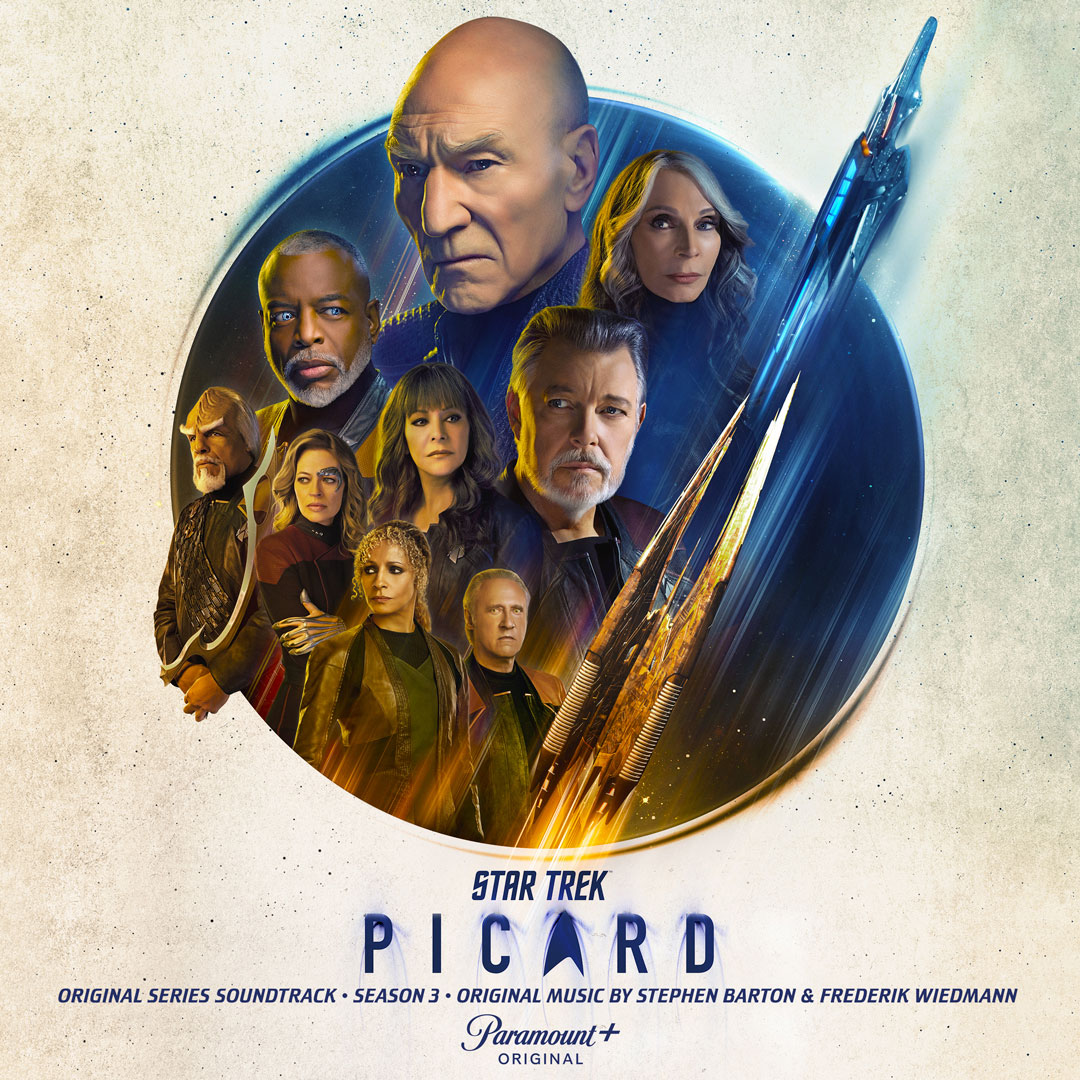
Lakeshore Records has announced the release date for Star Trek: Picard’s Season 3 soundtrack, a whopping 45-track collection of score from composers Stephen Barton and Frederick Wiedmann.
Arriving digitally on April 20, 2023 (coinciding with the Picard series finale), the extensive collection of music spans the entire ten-episode run of the show’s final adventure. There will also be a special vinyl release for the Season 3 soundtrack:
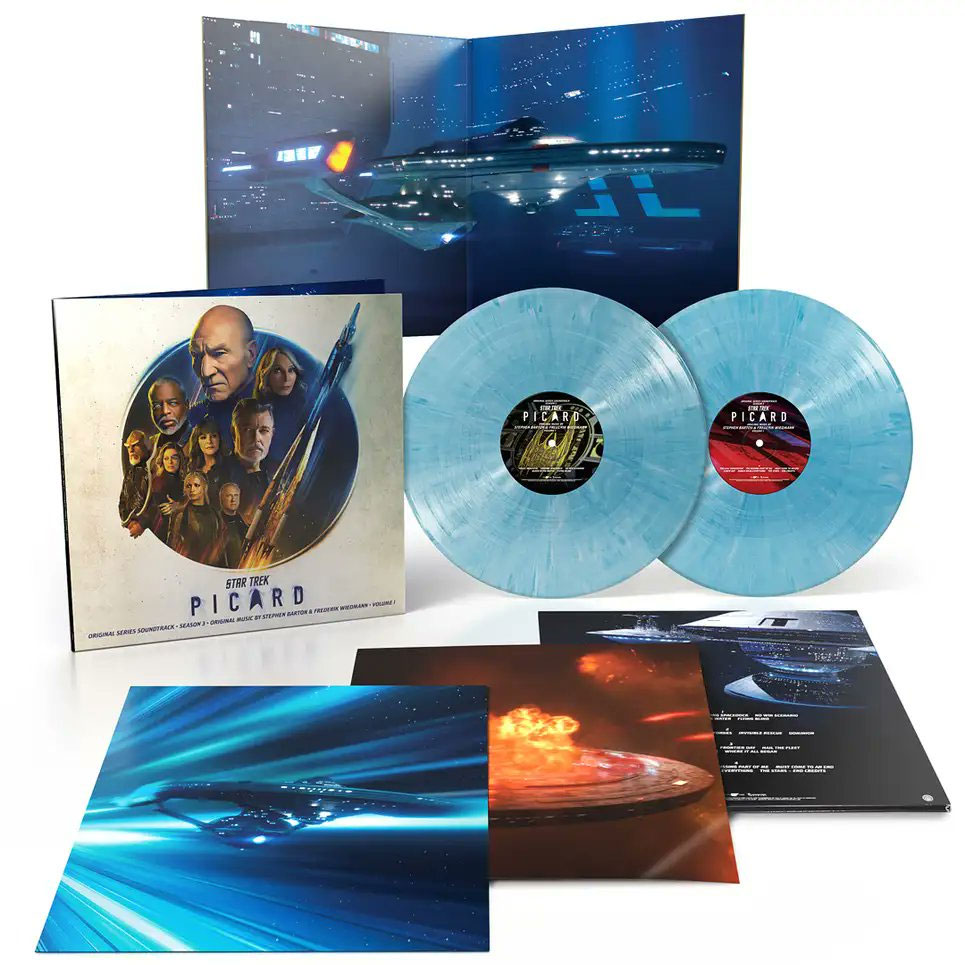
You can pre-save the digital soundtrack release here through Spotify, iTunes, and deezer, and check out the full track listing below.
1. Beverly Crusher (3:02) 2. Old Communicator (1:58) 3. Hello, Beautiful (1:57) 4. Leaving Spacedock (3:44) 5. I Like That Seven! (3:29) 6. Breaking the Beam (3:59) 7. The Shrike (3:34) 8. Picard’s Answer (4:08) 9. Riker and Jack (2:08) 10. Call Me Number One (2:02) 11. No Win Scenario (3:57) 12. Blood in the Water (2:58) 13. Let’s Go Home (3:24) 14. Flying Blind (5:51) 15. A New Family (4:16) 16. Klingons Never Disappoint (5:32) 17. I Do See You (5:26) 18. Legacies (3:15) 19. Evolution (2:44) 20. La Forges (2:08) 21. Invisible Rescue (3:34) 22. Catch Me First (2:32) 23. Proteus (3:46) 24. Dominion (7:04) 25. Lower the Partition (3:38) 26. Get Off My Bridge (4:26) 27. Family Reunion (3:17) 28. Impossible (1:37) 29. Frontier Day (2:43) 30. Hail the Fleet (4:03) 31. You Have the Conn (3:44) 32. Make It So (6:02) 33. This Ends Tonight (3:07) 34. Battle On the Bridge (2:58) 35. All That’s Left (2:02) 36. Annihilate (3:05) 37. Trust Me (2:06) 38. The Last Generation (2:51) 39. Where It All Began (2:19) 40. The Missing Part of Me (4:30) 41. Must Come to an End (1:32) 42. A New Day (3:22) 43. Legacy and Future (1:44) 44. Names Mean Everything (1:43) 45. The Stars – End Credits (2:59)
Star Trek: Picard Season 3 will continue with “Dominion” on March 30 on Paramount+ in the United States and on CTV Sci Fi Channel and Crave in Canada — following the next day in the UK, Australia, Italy, France, Germany, Austria and Switzerland. The series is also available on Amazon’s Prime Video service in most other international locations.
- Behind The Scenes
- Frederick Wiedmann
- Lakeshore Records
- PIC Season 3
- Soundtracks
- Star Trek: Picard
- Stephen Barton
Related Stories
Holly hunter cast as star trek: starfleet academy’s chancellor, pinewood toronto dedicates soundstage to the star trek franchise, interview — sonequa martin-green on burnham’s “face the strange” encounter, search news archives, new & upcoming releases, featured stories, lost-for-decades original star trek uss enterprise model returned to roddenberry family, star trek: lower decks cancelled; strange new worlds renewed for season 4, our star trek: discovery season 5 spoiler-free review.
TrekCore.com is not endorsed, sponsored or affiliated with Paramount, CBS Studios, or the Star Trek franchise. All Star Trek images, trademarks and logos are owned by CBS Studios Inc. and/or Paramount. All original TrekCore.com content and the WeeklyTrek podcast (c) 2024 Trapezoid Media, LLC. · Terms & Conditions

- May 27, 2024 | Preview ‘Star Trek: Discovery’ Season (And Series) Finale With New Images, Trailer, And Clip From “Life, Itself”
- May 25, 2024 | Trek Long Island Bringing Star Trek Community Together For A Unique Fan-Run Convention
- May 24, 2024 | ‘Star Trek: Resurgence’ Now Available To Download On Steam And We Are Giving Away Free Codes
- May 24, 2024 | Podcast: All Access And Lisa Klink Explore “Lagrange Point” On ‘Star Trek: Discovery’
- May 23, 2024 | ‘Star Trek: Discovery’ Continues Climbing The Streaming Top 10 Chart
Interview: ‘Picard’ Season 3 Composers On How They Are Reviving Classic Star Trek Music
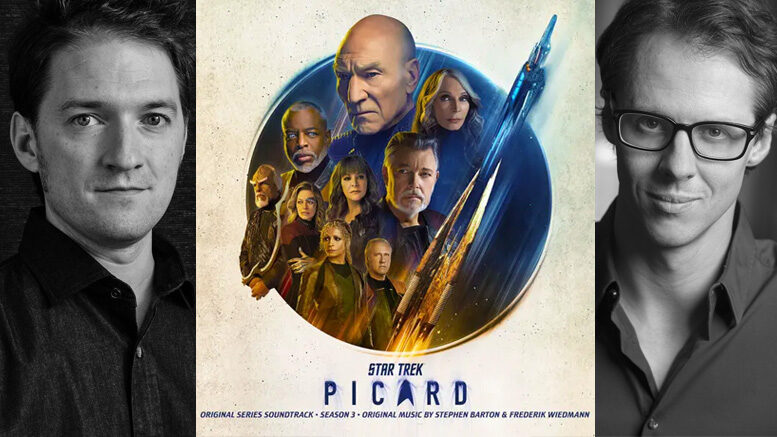
| March 29, 2023 | By: Jeff Bond 50 comments so far
Paramount+’s recent Star Trek series Discovery and Picard have employed composer Jeff Russo to bring a modern edge to the shows while occasionally tipping a hat toward the thematic material of earlier Trek composers. But for Picard’s third season, showrunner Terry Matalas recruited British composer Stephen Barton, who worked with Matalas on SyFy’s 12 Monkeys , and Frederik Wiedmann (who’s scored everything from numerous DC animated movies to children’s TV shows and video games). The pair were given a specific mission: resurrect the bold, in-your-face orchestral style of the classic Star Trek movies, with major callouts to themes by Jerry Goldsmith, James Horner, Cliff Eidelmann, and even Leonard Rosenman. The result is some of the most exciting Star Trek scoring in years, music that has fans fired up for the imminent soundtrack release. TrekMovie sat down with the composers for an extensive discussion to talk about this classic musical approach and how they tackled it.
Who do you guys answer to on Picard in terms of scoring? And what was the brief, just in general, when you started?
Stephen Barton: Terry Matalas and I had talked about Trek for a long time, actually, particularly when 12 Monkeys was going on. He’s a veteran of Star Trek —he was a PA on Voyager and then worked as a writer on Enterprise . So he’s kind of come up through the ranks on the Star Trek side. And when I first started working with him, five, six years ago, it was something we chatted about quite early on. I think even when I first met him for lunch on the Paramount lot it was one of the things we chatted about. And add the fact we had a shared past in that sense, in terms of what Trek we had grown up with, which was for both of us a case of parents having seen the original series, but the first time we got a series of our own was really Next Generation and watching it as kids. He’s a little bit older, but I was watching it when I was like five or six. I think for both of us it was very much a defining point in our relationship with television and with media in general. Akiva Goldsman was still very much running Picard season two and Terry was very much involved at the beginning of the season as a writer but about three or four episodes in he split off to really look after season three, which was always going to be his baby.
Terry very much pitched it to us as this idea of, let’s look back to the whole of the franchise and let’s look back, really in-depth at the Horner and the Goldsmith scores. Let’s look back at Dennis McCarthy’s work. Let’s look back at Ron Jones’ work, Cliff Eidelman, and Leonard Rosenman, looking back at all of it, let’s take a step back and look at what it means. And because the other thing was, obviously with Trek there’s been so many iterations and things used from one version into another, sometimes without a sense necessarily of what specifically something means. Even the Alexander Courage theme, this is a general Trek theme now and even was, I think, by the third movie, with the idea that this isn’t a specific thing; this is a wider theme. So, I think that was always what we were talking about.
And then as we got through the season, we were about six episodes in and one of the things we set out to do at the very outset was score it all. We weren’t going to do the typical TV thing of tracking, but the problem is, the shortest episode is 50-something minutes. So it’s 500 and something minutes of television. To most TV shows it would just be, we’re going to track half of this, or track a third of this or have three episodes in the middle which are just edited with some interstitials and things like that. And he was like, “No, no, I want to treat every scene of this like one of the scenes in the feature films.” And so, there are two ways to do that. Either you write a ton of music or… well, that’s basically the only way of doing it, really. So that was kind of the genesis of it. And we got about episode six, and I think I’d been on it for three months, I’d written about five hours of music, and was just dead, and we got to this point where we’re like, do we sacrifice the vision? Do we sacrifice that? Or do we get some help? And mercifully, episode seven to nine had a ton of Freddie’s music in the temp track. Because I think that’s one of the things that Drew Nichols, our editor, tried to do-he tried to temp with not Star Trek music, just to be able to get a lens on it, that was different to just putting Trek music wall to wall, which is obviously incredibly easy to do, because there’s so much of it. So Freddie came in and saved the day and took two episodes over and knocked them out of the park, and actually really allowed me to do what I want to do, which is to land the last 30 minutes of the final episode.
Frederik Wiedmann: I was just looking at the minutes for the final episode and I’m counting 55 minutes of music. In one episode of TV.
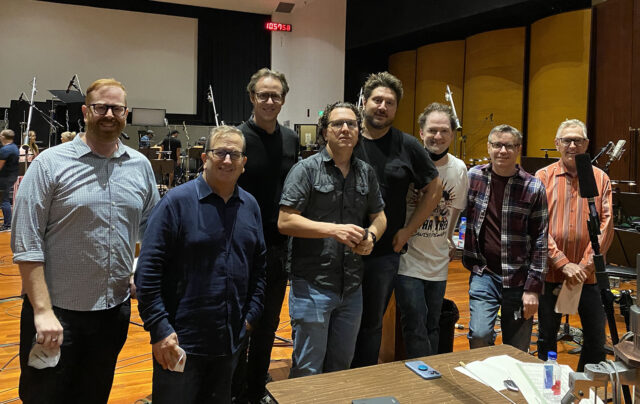
Frederik Wiedmann, Drew Nichols, Terry Matalas, and Stephen Barton (center four L-R) during Picard scoring session at WB Eastwood scoring stage
Since you mentioned Ron Jones, did you discuss the whole Rick Berman aesthetic versus what Matalas wanted? Because even though the scoring is different for the first two seasons of Picard , there’s a lot of active music, but this in particular, it’s very upfront in the mix and hits things. It is more of a movie aesthetic or a Ron Jones Next Generation aesthetic, as opposed to what the TNG music turned into by season four or five.
Barton: Yes, we discussed this at length. It wasn’t necessarily always even with the Ron Jones stuff what the music was doing in terms of harmonically or thematically, it was just in the way it’s paced and the way it’s scored. And I went back and watched what for me is the pinnacle of season three of Next Generation —at the end of “Best of Both Worlds, Part One,” the end of season three, which for me was ingrained in my mind in the summer of 1990. You have music that’s very overtly scored, it goes right for the jugular, it’s not holding back at all, but it works and it’s not full of music that you separate from the picture, it just is part of it. And so, scoring like that, that it’s okay to be big and it’s okay to go off to moments. And funny enough, I think in episode three, we had a big homage—there’s a big sequence with the first time Vatic fires the weapon, that’s very much an homage to Ron Jones throughout that whole sequence. It just goes there and it says, let’s turn the burner up to 10 and go maximum in terms of the way it’s scored. It’s okay to be big and it’s okay to make bold statements and okay to play melody. And I think that was very much the focus, because that’s what we loved from the Trek both Terry and I remember; that’s kind of a hallmark of it. And Freddy has a number of massive moments in episode seven that are very, very similar, that were just moments where you play it.
Wiedmann: It’s funny, when I watch old movies, including all Star Trek , I’m always baffled by how little music there is actually, in an episode or a movie, how much space there was back then, that was okay. Even when you watch a James Bond movie from the Sean Connery-era Bond, there is so little score in the entire movie. And when it comes, it’s big. It’s bold, and it has a very distinct purpose. I think the aesthetics have changed a lot over the past 20 years in terms of scoring movies, especially in the sci-fi genre, where there’s a lot more music now, and a lot more subtle stuff in between. What used to be just empty space and ambiance now has something like a little pulse or something going on to keep the tension going, that we just didn’t do back then. And I think one of the big challenges in this particular Trek was how do we make it feel like the old ideas, and the old sonic templates for Star Trek while taking it into this current time of scoring? And I think that the response so far has been fans have absolutely noticed how much we go back to the roots of Star Trek sounds while also kind of giving it this modern edge I think it needed.
You have, I think, at least five or six themes that are preexisting, very specific melodies. And then you provide one major new one, I know that there are other pieces of new material, too, that you guys develop, but you have a theme for the Titan that is in the end title. So first, tell me a little bit about developing that. I was talking to someone who’d seen the early episodes before I had and he said, “They’re playing James Horner music.” And when I heard this theme, I realized the theme is not James Horner’s, but the setting it’s in is very evocative of Horner.
Barton: Yeah, that was 1,000% the goal with that. I think the thing that Horner brought to Trek , which I think some people would say is not in the Goldsmith scores—but I think it is, it’s just a lot more buried—is that kind of nautical thing, the militaristic feeling, but it is a very specific, militaristic thing of very much feeling that these ships are just boats in space. Everything from the very classical horn kind of harmonic series, like we’ve got two horns in pairs going up and down the harmonic series, those sorts of motifs, they have a very English feel, and that was something that Horner was very interested in. He was obviously an anglophile and I had the pleasure of meeting him once, actually, only at Abbey Road one time, but I think that that part of Trek was something we felt had been put aside a little bit. It wasn’t that we wanted to necessarily turn it back to being Wrath of Khan but it’s just acknowledging the fact that whilst this is a ship of exploration, it’s still a military command structure, there’s still danger, and I think that the Horner scores for me (danger being one of his motifs, literally , but we then do use his danger motif), it was one where we talked at length about it as, “This is the strongest of spices,” in terms of its musical presence, and I think that’s why James Horner liked it. It’s just such a bold statement, that to not use it to us was almost disrespectful. We’re not going to plaster it everywhere, but I think when we’re in the nebula, there is obviously a bit of a callback to the Mutara Nebula cues.
And so the Titan theme, I think I looked back through a lot of the orchestration, and had access to a fair number of the written scores and I was really looking about how it was constructed. And what was really interesting about Horner’s scores is how he works with limited resources. You get a sense of a very full sound playing, but it isn’t tutti, it’s not wall-to-wall, whereas the Goldsmith scores tend to be very dense, there tends to be a lot going on. And virtually everybody is doing something—during the main title, I don’t think anyone has any bars’ rest in the whole piece, they’re all doing something, whereas the Horner scores are often quite stripped back, very pointillistic, and very focused in their orchestration. There might be quite complicated things, so you have these violin arpeggio figures and I was having to sort of consult on whether they were even playable, because some of them were trying to do some augmented chord stuff that was a little tricky under the fingers. So I think that was the overriding thing with the Titan theme; it was very much an homage to James Horner versus the rest of Trek stuff, the Jerry Goldsmith stuff.
Here is the brilliant @ComposerBarton conducting his Titan theme with all those wonderful nods to Horner in his arrangement. String section only. It’s been stuck in my head for over a year. #StarTrekPicard pic.twitter.com/f5YCKXI6MS — Terry Matalas (@TerryMatalas) March 4, 2023
So did you sit down and discuss or map how you were going to employ all these themes? Because you’ve got Goldsmith’s March theme, which became the Next Generation theme; you have his First Contact theme, and you have that motif that’s actually from Star Trek V [the “Busy Man” motif from the cue of the same name], and the Klingon theme—and it’s obvious how you’re going to use the Klingon theme, but the other themes, you’re using them but not necessarily the way they were used by Goldsmith. So how did you decide where you were going to apply these themes?
Wiedmann: For my episodes, in particular, it was really all Terry’s roadmap. He’s got an incredible knowledge of Star Trek music, going back to the beginning of it, more than anybody I’ve ever met. And Terry gave us this specific and detailed kind of map, with, “This theme here, I want this thing here.” And he and the editor Drew, they kind of created this roadmap for us where things needed to be dealt with, small adjustments based on our creative ideas that the music had to adjust to, as we were writing. But in general, I would give Terry all the credit for placing the moments and the thematic ideas from the old Trek into the right pivotal places.
Barton: The “Busy Man” motif [from Star Trek V: The Final Frontier ] came to represent a lot of the stuff to do with both Commander Data and then also it’s almost like a nostalgia theme. It’s used in a few places where it’s not specific to that, but it’s used in a couple of places where it’s used to introduce the First Contact theme. And that’s been something where, lots of people say, “Oh, it’s the First Contact theme, it represents first contact. And to me, actually, when you look at the way Goldsmith uses it, the most poignant usage of it for me is in the scene where [Lily, the Alfre Woodard character], is seeing Earth from space for the first time. When she points a phaser at Picard and he gets her to put it down, and he says, “Okay, you’re really on a spaceship.” So for me, that theme always represented the love of spaceflight, and for me what I think Goldsmith was so good at doing was finding themes that can play from different perspectives. So, in those sequences, it’s playing both from the perspective of the audience looking through the crew’s eyes, like you’re going back to this great historical event, but also then you’re looking at the perspective of Zefram Cochrane and you’re looking at all these people with the goal of spaceflight ahead of them.
So, for me, that was always the “nostalgia for spaceflight itself” theme. And so that’s a lot of why we use that in the end credits. And also partly because it was one of those ones where we just felt that theme deserves to be heard more. We put it on the end credits because we felt that it just said something in a really nice way; that it said a lot more about what we were trying to say about the season to the audience. Then the Titan theme, I think very much was looking towards the same thing, where the original Jerry Goldsmith march became very much the Enterprise theme and very much represented the ship and its crew, and we knew we needed a theme for the Titan to do the same thing. This is the Titan and its crew, and obviously, there are places we then take that we haven’t shown yet, so very much that has a purpose and that is going somewhere.
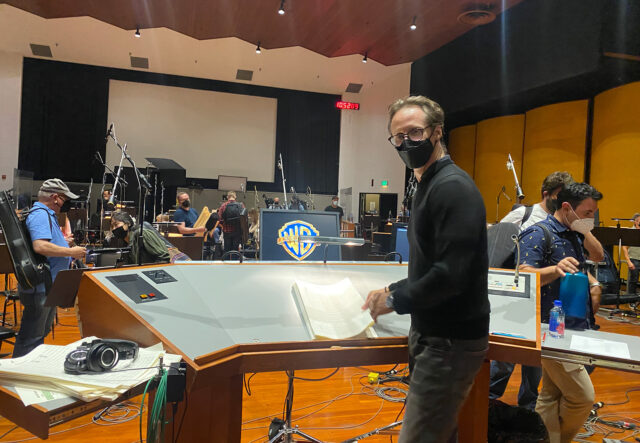
Frederik Weidmann during a Picard scoring session
I think there’s some variation, at least one variation early on of the First Contact theme, something where it’s presented in a way that hasn’t been done before. So obviously, you’ve got access to the written scores for all this material, but have you internalized any of it enough so that you can just go ahead and write that? Or do you always need to refer to the written scores?
Barton: Really good question. Some I have internalized, because some of the genesis of that music and some of the influences on that music, I would certainly count as influences my own, particularly in some of the lesser-known influences, some of the English composers particularly. Growing up with a lot of English choral music and things like the Walton Henry V score, that’s not a million miles away at times from some of the stuff Horner was doing in terms of some of the ways it’s built, and particularly the horn writing. I think that’s one of the hallmarks, but it draws from other influences, too. But there’s a very Waltonian thing in there. And it’s funny with the Shakespeare reference, which plays a lot into certain parts of Trek , and I don’t think that’s an accident in the sense of how it’s scored. So I think that stuff comes a lot more naturally. I find the Goldsmith stuff harder to work with in terms of how it’s built, largely because it’s so heavyweight. He built the big sound before anyone else does. When we sometimes think of combos in the ‘90s and 2000s, of doing the big wall of noise and synths and stuff like that, he was doing it well before then. It’s very much that use of the whole spectrum, and the difficult part of that is time. Building those really dense scores takes a while. I can’t really rush it. And we just didn’t have very much time.
Wiedmann: I can tell you that there’s a short synth-only theme from Goldsmith that we’re using in the later episode for a very particular character. And it took me ages to make that sound out of my synthesizer. There’s probably just a patch Jerry had on some old keyboard, but I had to create it to make it feel just like that, and it took me way longer than dissecting an actual orchestral score. It’s a theme played with a very specific synth sound that fans will be able to tell exactly who I’m talking about when they hear it, so I really can’t talk about it because that hasn’t aired yet.
There’s a specific sound in movies you hear a lot for the past decade. Supposedly, Hans Zimmer invented it, but I’m not necessarily sure that he did. It’s this thing we just call the “ Braaam .” It’s this big bass noise that’s in Inception . But I was thinking actually, that this almost goes back to the blaster beam Goldsmith used for V’ger in Star Trek: The Motion Picture . That was actually the first time that kind of approach was used, and so it’s unique and specific to that. And I was thinking, “Oh, this is almost like blaster beam sound,” in some of the Shrike scenes.
Barton: Yes. Very much. I think we had exactly that conversation in February. It’s interesting where things like that become ubiquitous, and particularly in trailers. You could look at it two ways: on one side you could say, “Well, it’s a lazy trope of action writing.” But then you could also look at it as at its core it’s fundamental—you can go back to Carl Orff, Carmina Burana , if you play the orchestral version, not necessarily the two-piano version, it basically starts with that figure, and it’s one of those strong spices. I think the problem is that sometimes the tendency is to just chuck it in like a handful of chili peppers that blows your head off in two seconds. Fabulous, but then 10 minutes later, you’re like, it’s not a particularly good experience, and you’re regretting it. Gordie Howe and I talked about this a great deal on Star Wars as well, on the stuff we’ve been doing together, because if you just plaster the “Force Theme” everywhere, it loses any impact it will ever have. And it’s one of the most precious gems you can be entrusted with. So, I think even when Freddy and I were working out where we have these themes, literally sitting down and asking yourself, how should this be harmonized? Or how should this be accompanied and what’s the arrangement and making it not just a, “press button, Trek theme here,” but actually something that weaves in and out and feels cohesive with the narrative. We did a wonderful session with Craig Huxley, who plays the blaster beam, and we brought him in on the first episode to do some of the sound design around the Shrike.
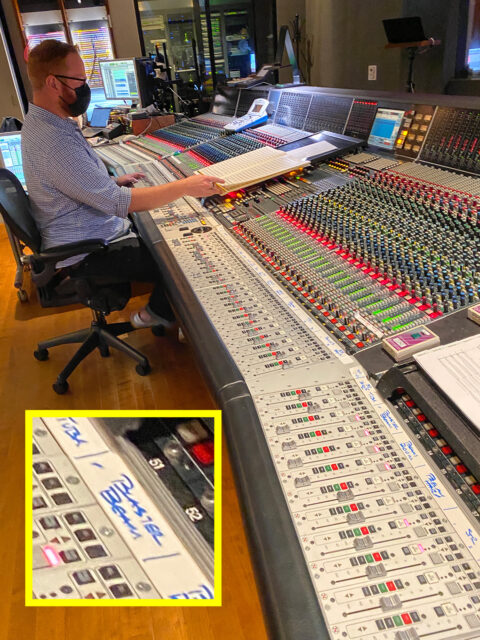
Blaster Beam on the mixing board from Picard scoring session
Tell me about some of the other new material that you guys produced. And in terms of what you can talk about, there’s a number of dialogue scenes between people where you guys come in very quietly, and I was feeling like I was starting to hear melody, maybe for Roe and Picard. There’s something that plays I think when they’re having their final goodbye. And then you also hear it when Riker and Picard are looking at her Bajoran earpiece, her spycraft. And there’s a big birthing scene in the nebula that has this specific music for it. So how much specific character-centered material did you come up with?
Barton: That’s the family theme, which is what we eventually christened it. We went through many names, it didn’t really quite have a name at first. It’s something that is in the nebula birth sequence, but is hinted at throughout episodes earlier; you kind of hear hints at it. There’s a very, very oblique reference to it the very first time Beverly and Picard catch eye, that very slow string arrangement, but it’s very buried in there. And gradually we unfurled it, and it’s actually very much based off the Star Trek V “Busy Man” motif, but it’s upside down. So the flow takes the first three notes of that and then expands out and that was very much deliberate, and there are reasons for that, actually, that we can’t talk about yet. But there’s a very good reason for that. So the family theme, I think, was the big one, that we unfurl and kind of show for the first time in its full bent. And the other thing that Terry was very adamant about was that he wanted a theme that had a beginning and middle and an end that you play the whole way through. And then, funnily enough, we played it again in Episode Six, pretty much end to end as well.
Did you rerecord the end title, the arrangement of the First Contact theme and the march?
Barton: Those two aren’t rerecordings, those two are actually the original recordings. We went back and found the original—I forget what the mixes of them were off the top of my head, whether they were just LCRs or whether they were 5.1, I think I think First Contact was 5.1. And so they’re cleaned up to a degree so it is a bit of almost a remaster, but those two pieces, we didn’t rerecord. But that was largely because of time, because the other thing we inherited was very much a schedule from two seasons of previous TV, and to a degree of budgets as well. So we had one session in LA where we recorded, I think, 41 minutes in three hours—the musicians were just amazing; we could not have done this anywhere else. The L.A. musicians just killed it, but so many of them have played on so many of the scores. I think when [music contractor] Peter Rotter put the call out, we very much said what it is and we went out after people who had played on [the previous Trek movie scores] and said, “This is what we’re trying to do. We’d love you to come play.” So we had some players who I hadn’t seen in a number of years at the session, and we were actually very honored to have Steve Erdody, who’s playing cello. It was I think his last session pretty much not If not his last batch of sessions, but maybe his penultimate; I think Indy V might have been his last.
There are some pretty deep cuts and other things you referenced. For Daystrom Station you are referencing the orbital office complex music from Star Trek – The Motion Picture . And then there’s the whole museum scene where you even referenced Leonard Rosenman’s Star Trek IV: The Voyage Home theme, which I was really impressed by.
Barton: Leonard Rosenman and sneakily, there is the Horner Klingon theme on the top! That cue, I literally kind of sat down and said, “How many references can we get in?” Some of them are all completely obvious. But even there, we looked at how the harmony, for example, of the Voyager theme—because I find that to be one of the most restrained Goldsmith things where, so often where he pulls back, and really, you’re just dealing with two lines—there’s the melody line, and just a counter line, there’s no real harmony and everything’s implied, and I’m saying, “Okay, how can we even reference that and say we want to call back to that and the way it weaves through?” And so even when Jack gets his idea at the end, there’s a callback to the [ Voyager ] synth theme. I think it gave the studio a bit of a nightmare on the cue sheet because it’s like nine segments. And I think on the soundtrack that’s actually just gonna be listed as like eight Star Trek themes in the space of 90 seconds. And it was a challenge to make it make sense as well and not just feel like, “press button, press button…” I think if anyone’s going to criticize us, I think there’s just the thing of something Terry and I chatted a lot about, which is what would Jerry Goldsmith have done on the sequence? He has these great themes, and I think he probably would have gone to the approach of doing a million other things, and they would have pushed him back and said, “Well, we just want to hear the Voyager theme when you see it with Seven, so, please give us that.” But then he would have done it with consummate class. And that’s obviously the highest bar you can get, and I think in 25 years’ time, someone will say whether we reached that or not, but we certainly are not the ones to be the judge of that. So we’re just trying to do as well as we can.
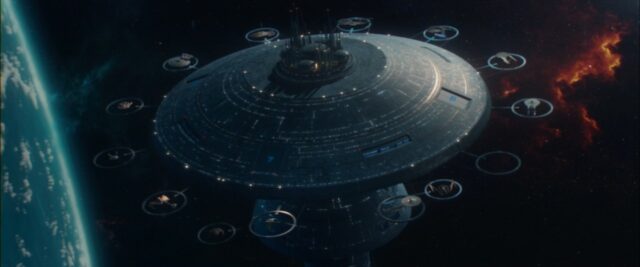
The Fleet Museum brought back a lot of themes
I was getting choked up during the museum sequence. It is very literally fan service but it’s done very well and tastefully, and especially after everything else that has been built up it works beautifully. When I first started watching this I was initially kind of groaning because it seemed like it was diving so deep into, “we’re gonna do the lost son from Wrath of Khan .” And by the time I got to episode three or four, it all just was working so well, that I really felt like, “Okay, now they’ve earned all this.” And it stops becoming just, we’re gonna throw references to the fans, and it becomes much more like affection, and kind of earning all that and using it and in a really moving way. And the scores are a big, huge part of this. And it’s not just all the references, it’s the approach, the dynamic approach of having real action music and having big commercial playouts and all those things we associate with the older movies and shows.
Barton: Freddie has, without spoiling anything, a cue in episode seven that I think is eight minutes long or something, and it’s one idea. We were into the last three, four weeks, and we still have this pile of music to write, but it was one of those ones where you look at the sequence, and there’s no tracking, there’s no editing that can get you through this sequence. And that’s true of all of the back four episodes, seven through 10. I think that was the other thing we were very much thinking about when we were doing a lot of the action music. And Freddy and I chatted for quite a bit about this: the pacing, particularly when he gets to the final episode is like, how would you get bigger? How do you find places to pay this off? Funnily enough, a lot of where we found the answers to that was in the Goldsmith stuff. Because I think one of the Goldsmith hallmarks is his ability to use silence and his ability to write something big and massive. He’s a master of huge textures, but also a master of when to shut up and let something play. And so in all four of the final episodes, I think there are times we both realized you just pull back and you just let a moment be a moment, and you just be confident that we have the performances and we’re not trying to apologize for anything in terms of the production. The other thing we have is the visual effects are so much better now. We’re never trying to tell you something looks awesome because it probably does. And I think that a lot of the reason for modern film scoring and action scoring being the way it is, is because you see something so amazing on the screen. It’s almost like people are like, “Yeah, you don’t really need to add to it.” Whereas what you can do is realize that that’s not the total idea. The idea is, it’s okay to paint big themes around there, provided you do it in the right way and from the right perspective.
Wiedmann: I think this goes back to another question you had earlier, about new themes that I can’t talk about much. But there is a Jack Crusher idea, a musical idea that comes in the later episodes as his relationship with his father becomes more and more distinct. And his performance was so on the spot every single time that it just felt like you don’t want to do anything. So the theme for him in those particular ones is extremely subtle because he just does it all. So it’s really just very subtly supporting what’s going on, but the performance is so strong that you really don’t want to overstep that. There are so many instances of that throughout the whole season. I think that we’re almost like, “Let’s not break it.” Because it’s so good to begin with.
Frederik Wiedmann at a Picard scoring session
Yeah, that’s something I think people who didn’t grow up on it don’t understand about the older movies and television is that the music was the special effects and it was the sound design on a lot of these things. Before you came up with all these layers of Dolby sound and super sophisticated visual effects, the music had to sell all that stuff. And so it wound up doing so much more dramatically than you necessarily have to now. So what can you tell me about the soundtrack?
Barton: I think it’s about two and a half hours. That was a pretty heavy cull down from five hours. But I think we very much also wanted it to stand up as a listening experience in its own right. Gordy and I have Star Wars , we have a three-and-a-half-hour soundtrack. And at that point with these things, I’d be honored if anyone ever listens to it from start to finish. That’s the nicest compliment I think anyone could pay. But I think what we tried to do is to make it make sense. The funniest thing about the soundtrack is we didn’t cut it. And that sounds terrible. Terry cut it. We presented him a draft and we were chatting about it. And then the following morning, he’s like, “Yeah, I stayed up all night and cut this together,” and gave us a spreadsheet. Not only is he incredibly musical, he actually loves sitting at the back of the room while I write. He just loves it and will actually weigh in with suggestions. And most composers, I tell them that and they go white, and they’re like, “Are you kidding? The director’s in the back of the room while you’re writing, are you insane?” But he’s got such a good sensibility for it. And he’s not someone who says, “Yeah, go up, now go down,” or something like that, but he’s like a rather good composition teacher in a way without knowing it. Without having a background in music, he asks questions and says, “Well, is that theme, does that feel satisfying?” One of the things he often talks about is he wants his music to commit. And I think that’s what sets him apart from a lot of filmmakers in terms of how they handle music. He likes the music to go there. He’s like, “Commit to what you’re doing. Commit to shutting up, if you’re shutting up—get out, don’t leave some little pad.” He’s like, “Just shut up. Don’t be afraid to make the bold choices.” So that’s very much his directorial style. So he cut the soundtrack together, literally put it together and we listened through but I think we changed one track.
I’ve been into this music since I was a kid and it’s very much waxed and waned in terms of how much fun it is. This is very fun. And it definitely feels like something I want to listen to outside of the show and it helps drive the show and make it exciting. So, all props to Terry for being someone who wants that. Because it seems like filmmakers over the past few decades have been very conflicted about whether they actually want music as a real contributor, as a character, as opposed to just filling in the silence.
Barton: I think there was a process that filmmaking went through in the 2000s, and particularly with the boom of digital cameras, digital cinema, and the speed at which the process and the difference between the editorial versus where it’s gone to the Avid, and now we have the online and the offline and there’s the whole process of filmmaking. I think people thought we were going through a growing-up period where less music is more, and undoubtedly films were “less music is more,” and undoubtedly films did take the approach that the filmmaker wants that. That’s their prerogative. Now we’re passing through that and we’re getting to a place where it’s okay to be musical again. And I listen to a lot more scores now and hear a lot more scores where I actually like the music. And I think where it goes in the next 10 years will be very interesting. I think we’re starting to come to a place now where all of those languages are okay, provided you know what you’re doing with them. And so people are coming back to it and saying it’s okay to be melodic, it’s okay to have tunes, it’s okay to develop them. It’s okay to have a theme and call it something and have a leitmotif. That’s okay, again.
Wiedmann: One thing this whole experience working on this show taught me is there’s a lot of film music from 25 plus years ago, when you listen to it today, and you go, “This is not really what we’re doing anymore. This doesn’t really go with today’s aesthetic of moviegoers.” But anything that Goldsmith did, however old it may be, I think it holds up like nothing else to today’s standards. There’s nothing old or old-fashioned or cheesy sounding about it. It’s just like, “Holy crap, this is so fucking great.”
Barton: It’s taken 25 years to realize that.
Soundtrack announced
Lakeshore Records has announced they will be releasing the soundtrack for season 3 of Star Trek: Picard , containing 45 tracks . The digital release will arrive on April 20, the day of the season finale in April. You can pre-order the soundtrack on Vinyl for $35.98 , coming on May 12.
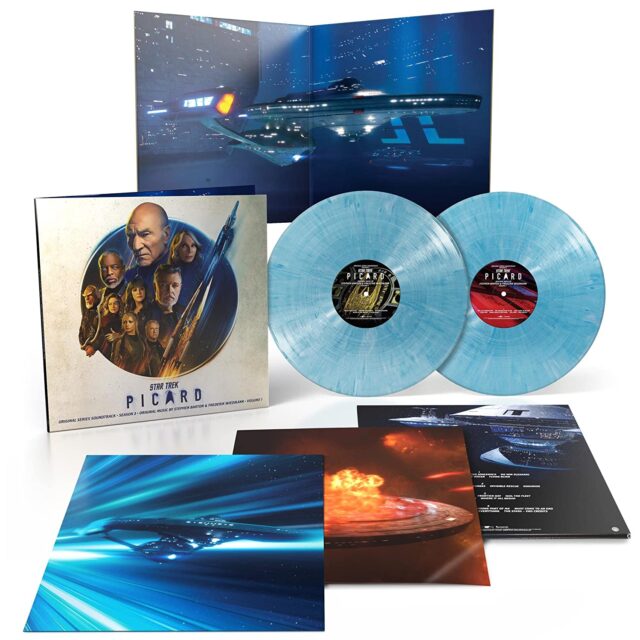
Jeff Bond is the author of The Music of Star Trek . He co-produced the 2012 15-disc box set of all the music from the original 196 6 Star Trek series and has written liner notes for releases of all the original Star Trek theatrical films from Star Trek: The Motion Picture to Star Trek: Nemesis .
Related Articles

Star Trek: Legacy , Star Trek: Picard
‘Star Trek: Picard’ Showrunner Terry Matalas Jumps To Marvel As Showrunner For New Vision Series
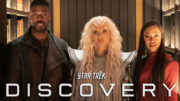
Discovery , Interview
Interview: ‘Discovery’ Writer Eric J. Robbins On Efrosians And More Star Trek Connections In “Labyrinths”
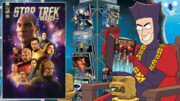
Comics , Star Trek Universe TV , Trek on TV
IDW Celebrating 500th Star Trek Comic With Big Era-Spanning Anthology
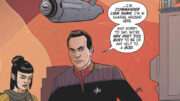
See Captain Sisko Meet A Familiar Face From ‘Picard’ In Preview Of ‘Star Trek’ #20
I would prefer more originality across the board myself
Agreed. It’s one thing to celebrate the franchises music, but this is a patch-work quilt of music written for entirely different scenes, characters, what-have-you. Can come over as leaning too much on prior musical greatness rather than doing something original that stands on its own two legs. It’s great to see the love and reverence for the scores however, and it’s incredibly well done. But it just seems an odd season/show to suddenly decide to celebrate Trek’s filmic music in particular, rather than it being a special Trek Anniversary or something. Too much reliance and memberberries!
Ditto. I don’t know why, but it really bums me out that they’re using the First Contact theme as the end theme — and I *love* that theme. But it just feels out of place and, well, borrowed/recycled here. I’d almost prefer the previous Picard theme (which wasn’t perfect). Or a new theme using some of the FC cues.
It’s kind of like how I felt the TMP theme for TNG. It’s one of my favourite movie themes, yet it never felt like it fit the show to me.
I thought combining the TOS theme and TMP theme to create the TNG theme was inspired. It easily became my favorite Star Trek theme. The classical opening narration continued Space The Final Frontier, and the music swells up. Just brilliant.
with all of these former “12 Monkeys” alum showing up on Picard, the one I would most like to see is Emily Hampshire ($chitt$ Creek)
She would be a wonderful addition. Shaw’s ex-wife, another captain, the event planner for Frontier Day, anything.
That would be awesome. But she’s a regular on” The Rig”, filmed about the same time as Picard. So it’s a slim chance at best.
It would be fantastic her and/or any number of 12 Monkeys alumni in addition to those who’ve already appeared. I just finished that show this week. One of the all time great series finales.
I was very much hoping Matalas would bring Hampshire into Trek as well.
Hopefully, he’ll have the opportunity to create as rich and wonderful character for her in a future show, limited series or movie as he did for Stashwick.
And yes, putting Stashwick and Hampshire back together in a scene would be the chef’s kiss.
Another captain would be nice. I want Shaw to be LGBTQ+.
Yep, also agree. I think she was the first person a lot of people thought of who would be involved in this season, even if it was for an episode.
I’d like to see Amanda Schull!
The score is wonderful. Plenty of legacy and plenty new that fits. I just love it all.
Same here. It’s magnificent.
Completely agree. It’s a fantastic score and I love it.
This was a very interesting read but I have to admit, I read the part where Barton was talking about composing for Star Wars and got very confused because when the interview said “Gordie Howe” my brain went “like the NHL player?”
Ha, you HAVE to be Canadian to know that name!
That’s what leapt to my mind also . ;)
No, American, but one of my headmates is Canadian and passed on his love of hockey to me. So I learned a lot about it, including about former players of some kind of note.
Picard season 3 has a great score so far. Job well done on that part . Just thinking about it even the weaker Trek movies are worth watching just for the score alone sometimes. I can just close my eyes , when one of the bad or boring bits crop up ,and just get enveloped by the music.
Absolutely!
Good point. I find this true as well. Generations and Insurrection , specifically.
My unpopular opinion is that I think that Star Trek III is the most under-rated Star Trek movie. It’s far from the best, but far from the worst. I love the music in that movie.
BTW: I noticed the TVH score played a bit when they showed the Bounty BOP in the previous episode.
To be honest, it’s probably the best “odd” Star Trek movie.
Found Matalas’ burner account!
Kidding aside, while this is an unpopular opinion, it shouldn’t be.
I absolutely love ST III, and have since seeing it in theaters. Sometimes I watch it even without watching WOK first. (But usually watch the two as one long movie).
Horner’s score for Star Trek III is my favorite of all the Trek movies new or old. Don’t get me wrong, Goldsmith’s score for The Motion Picture’s is amazing as is Horner’s work on Wrath of Khan. But, Search for Spock just rises that much more above in my book.
Your post just described my total viewing of TMP lol.
Star Trek 5 has awesome music despite the flaws of the film itself.
Awesome score so far on this show, definitely the best we’ve had in all of New Trek including the alternate timeline movies. I especially like what he’s saying about the Voyager theme in regard to Goldsmith’s restraint, and that it basically just has two lines and little harmony… but what they did with the theme *harmonically* for the museum scene was fan-tas-tic: it was just a few small harmonic tweaks (with a modified repetition of the three-note Voyager motif at the end), but it didn’t just make it weave through the scene, it really opened up the theme itself, made it deeper & more nuanced, and underscored Seven’s emotional state very well in that moment. That scene, in a masterful way, went far beyond fan service, and the composition was a big part of that success. Some absolutely brilliant composing for this season, for sure.
Just a quick word to praise this wonderful interview. It had great questions that elicited substantive and fascinating replies. Thank you!
Seconded. Great questions that really let these artists let loose.
Yes, thirded. Substantive discussion, no softballs.
For some reason, every time I hear a musical reference to the TOS movies, it takes me right out of the show. It’s like the auditory equivalent of seeing half the Titan’s crew wearing Monster Maroons instead of current uniforms. For whatever reason, I don’t think of it as “Star Trek” music, but as a historical signifier. I suppose it’s nothing more than a “me” problem in the end.
I feel the same.
The music is great
I’m am glad we are bringing back some awesome themes vs. the wallpaper music of TNG/VOY. Even the TNG theme was a watered down version of the TMP theme. Apart from the Borg music in TBOB I feel for the musicians as hard to utilize such forgettable music, glad to see they’ve decided to embrace the memorable TOS movie cues.
I love direction they’ve taken with the music this season. It’s fittingly more cinematic than the past few seasons and the rest of NuTrek. Great job!
Fantastic interview by Jeff Bond! I couldn’t have asked for better, just MORE!
Like so much of this season, the music harkens back to such a different and more nostalgic time and I love it! It’s a combination of nearly all the greatest Trek hits rolled into one.
I remember when the first teaser showed up on First Contact day announcing all the TNG actors were coming back and they played a piece of James Horner music in it. Many thought it was odd to include when in reality it was just giving us a taste of what was to come!
What I’ve enjoyed most is not the specific legacy cues, but how new music evokes the tone of certain older elements. It’s clear they wanted a James Horner “style” and they’ve captured it well.
Now we just need Strange New Worlds Season 1 Soundtrack!!
I preordered both the digital and the LP set (I wish there were a CD..) but I noticed the LP doesnt seem to have the 45 tracks as compared to the digital. Maybe I’m wrong.
Every time I talk to my brother about Picard, he says ‘it’s great… But how can they get away with using all that classic music and not even credit those guys?’
How could Horner rip off the same classical piece (sans credit) over and over again in his ‘work’? The opening of ALIENS and a sequence in PATRIOT GAMES are just two instances where he totally riffs on the ‘jog in a circle’ cue from 2001, which uses the Gayne Ballet Suite. And by riff, I don’t mean a bar or two, I mean MINUTES of score.
I am loving all the music in the sh0w, including the nods back to previous soundtracks. Star Wars has a very consistent feel to its music, since it all came from the same guy. I always thought that Star Trek had great themes, they just weren’t emphasized as well as they could be. This season is definitely flipping that around. Great article too. Thanks!
I think that musically they could have evoked trek simply by going deep into melody and percussion with new cues. There’s a bit of what Meyer called ‘getting kissed over the phone’ when music from another project gets tracked in, but it didn’t bother me on TOS, because the music was such a vital component, especially Kaplan’s DOOMSDAY MACHINE stuff as reused in IMMUNITY SYNDROME and OBSESSION.
Barton name-checked an absolute legend who deserves attention- Steve Erdody is one of the most prolific cellists in film music, and in classical circles as well. I love that this interview went to that depth on the creators and talent involved. If anyone is interested in hearing an interview with Steve, and to learn more about his work, check out this page: https://thelegacyofjohnwilliams.com/2021/07/26/stephen-erdody-podcast/
This was just such a great interview from you guys. Well done! Greetings from Germany!
I am a long-time fan of film scores, particularly Star Trek scores. These two composers knocked it out of the park. My ears and heart could not be more pleased.
- What to Watch this Week
- Newest films
- Films Playing In Theaters Now
- The Most Anticipated Films of the Month
- Popular films now
- Latest TV Series
- TV Series Schedule
- Popular TV series now
- Canceled, Renewed, and Ending TV Series
- Prime Video
- Hallmark Channel
- Portuguese (Portugal)
Star Trek: Picard Season 3 Soundtrack
- Action TV Series , Adventure TV Series , Canal+ , Drama TV Series , Oi Play TV , Paramount+ , Prime Video , Sci-Fi TV Series , TV Series

Season 3 • Episode 1 : ‘The Next Generation’ (S03E01)
Season 3 • Episode 2 : ‘Disengage’ (S03E02)
Season 3 • Episode 3 : ‘Seventeen Seconds’ (S03E03)
Season 3 • episode 4 : ‘no win scenario’ (s03e04), season 3 • episode 5 : ‘imposters’ (s03e05), season 3 • episode 6 : ‘bounty’ (s03e06), season 3 • episode 7 : ‘dominion’ (s03e07), season 3 • episode 8 : ‘surrender’ (s03e08), season 3 • episode 9 : ‘vox’ (s03e09), season 3 • episode 10 : ‘the last generation’ (s03e10).
Category: Action TV Series , Adventure TV Series , Canal+ , Drama TV Series , Oi Play TV , Paramount+ , Prime Video , Sci-Fi TV Series , TV Series
IMDB: Star Trek: Picard
Frederik Wiedmann

Stephen Barton
Related Titles

3 thoughts on “Star Trek: Picard Season 3 Soundtrack”
Does anyone know what the song is that is playing in 10 Forward Holodeck (Jean Luc & Ro Laren scene) in “episode 5” at the 28mins 38 Seconds mark? Thanks.
Episode 6…. Sorry I forgot to mention that in my last message.
The song that is playing in 10 Forward Holodeck bar, (Scene with Jean Luc & Jack Crusher) is the blues track “My Guitar Can’t Stand You No More” by “Duke Shelby”
When asking about what song is playing during a scene, please specify around what minute. Submit a question/answer or review. Cancel reply
Your email address will not be published. Required fields are marked *
Save my name, email, and website in this browser for the next time I comment.
Don't subscribe All new comments Replies to my comments Notify me of followup comments via e-mail. You can also subscribe without commenting.
'Star Trek: Picard' Season 3: Listen to "Leaving Spacedock" From the Soundtrack [Exclusive]
"Leaving Spacedock," evokes the nostalgia of 'The Next Generation' while inspiring hope for the future.
Ahead of the series finale of Star Trek: Picard , Collider is thrilled to exclusively debut a new track from the Season 3 soundtrack. The new track, titled "Leaving Spacedock" plays over a key scene in the penultimate episode which is now available to watch on Paramount+. We won't spoil it for you, but if you're a fan of Star Trek: The Next Generation , it's a moment that will likely bring tears to your eyes. When you listen to "Leaving Spacedock," you will be able to recognize familiar refrains from Star Trek's past including the breathtaking theme of The Next Generation , as well as the theme of Picard .
New to the series, composers Stephen Barton and Frederick Wiedmann took on the challenge of honoring decades of Star Trek while putting a fresh twist on the music. Season 3 showrunner Terry Matalas said, "The score to Season 3 of Star Trek: Picard is a throwback to the classic theatrical scores by Jerry Goldsmith and James Horner ." Barton and Weidmann's score beautifully celebrates the history of the franchise while instilling this series with a bright, thrilling sound that invokes all of the hope and heart that Star Trek is known for. The music also creates an emotional, heart-pounding background to the on-the-edge-of-your-seat action and adventure that Season 3 is filled with.
On creating new music for the series, Barton said, "It is a musical story about legacy, about family, and about mixing the best of the Next Generation and the ‘next Next Generation ;’ and we hope it takes you on an epic journey.” Meanwhile, Weidmann also had high praise for the orchestra they worked with to bring the score to life saying, "It was a dream come true to record our phenomenal LA orchestra for these episodes, bringing to life a huge legacy of Star Trek themes, as well as new ones."
RELATED: 'Star Trek: Picard's Gates McFadden Talks Reuniting With the 'TNG' Cast in Episode 8
Star Trek: Picard Season 3 Honors Legacy in More Ways Than One
Speaking of legacy, Star Trek: Picard Season 3 has beautifully set up the option to continue this journey with, as Barton said, the next Next Generation . Matalas has spoken about a possible spin-off series titled Star Trek: Legacy that would follow the offspring of the classic Next Gen characters that have been introduced this season like Jack Crusher ( Ed Speleers ) as well as legacy characters like Seven of Nine ( Jeri Ryan ) . The series would also provide plenty of opportunity to bring back the iconic TNG characters, honoring the past while looking toward the future.
The series finale of Star Trek: Picard , which will be screened in IMAX in participating locations , hits Paramount+ next week on April 19, and the soundtrack will be available on digital platforms on April 20. You can listen to the exclusive new track from Episode 9 down below.
Top 50 by Year
Lists Explorer
100 Most Featured Movie Songs
100 Most Featured TV Songs
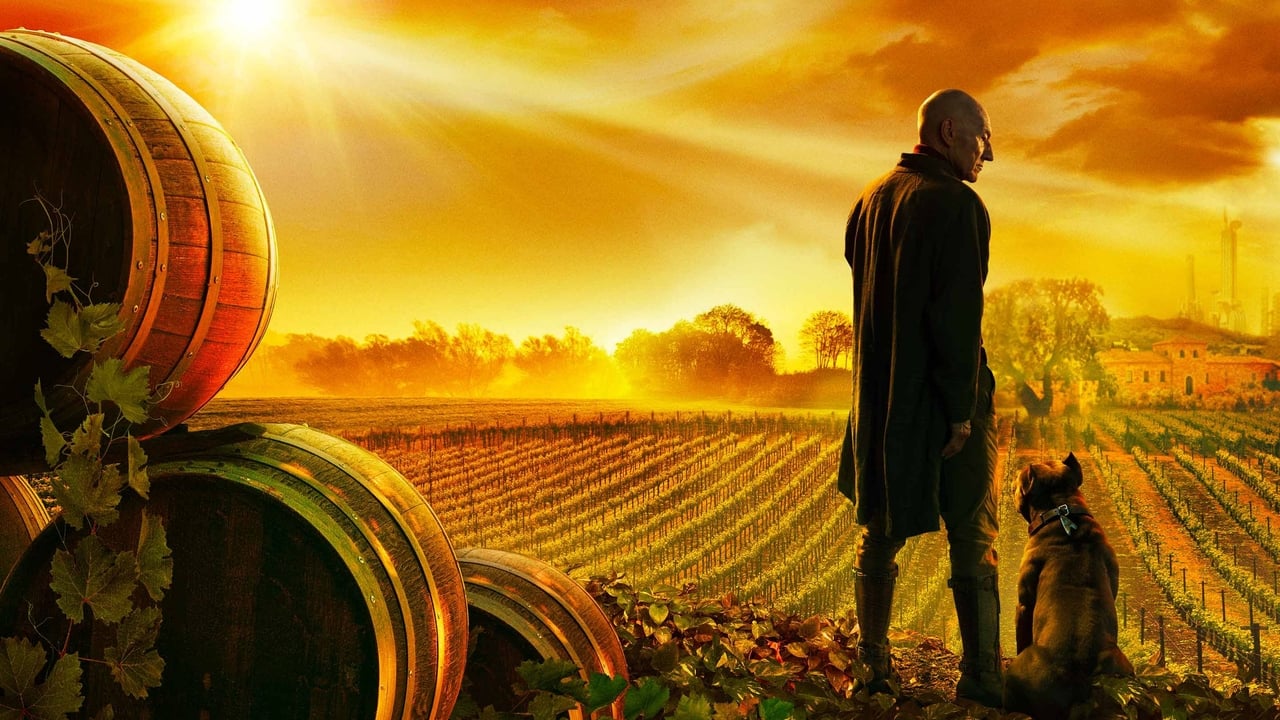
Star Trek: Picard Soundtrack [ 2020 ]
Star Trek: Picard
Season 3 • Episodes
The Next Generation
16 Feb 23'
Part Two: Disengage
24 Feb 24'
Seventeen Seconds
2 Mar 23'
No Win Scenario
9 Mar 23'
16 Mar 23'
23 Mar 23'
30 Mar 23'
6 Apr 23'
13 Apr 23'
The Last Generation
20 Apr 23'
Popular songs from Season 3
Ave verum corpus, K.618 (Arr. for Piano by Franz Liszt)
Wolfgang Amadeus Mozart
E3 • Seventeen Seconds
I Don't Want To Set The World On Fire
The Ink Spots
E1 • The Next Generation
Nocturne in E Flat Major (Op. 9 No. 2)
Les Troyens, Op. 29, H 133, Act V: No. 38. "Vallon sonore"
SWR Vokalensemble Stuttgart, WDR Rundfunkchor Köln, Chor der Württembergischen Staatsoper Stuttgart, Stuttgart Radio Symphony Orchestra & Michael Gielen
I Can't Stop Crying
Will Grove-White
E2 • Part Two: Disengage
Guilty As Charged
Whitney Shay
Can't Break Away from That Girl
E4 • No Win Scenario
Daniel Delaney
Rollin'
J Clearwater
Hans Deimel
Rumble In the Jungle
Star Trek Picard Main Title
Tv Show Info
Music Supervisors
Liza Richardson
CBS All Access
Returning Series
External Links
Contributors
WhatSong is the worlds largest collection of movie & tv show soundtracks and playlists.
© 2023 WhatSong Soundtracks. All rights reserved
Quick links
Star Trek: Discovery (Season 3) [Original Series Soundtrack]
April 16, 2021 40 Songs, 1 hour, 47 minutes ℗ 2021 Lakeshore Records
RECORD LABEL
More by jeff russo, featured on.
Apple Music Film, TV & Stage
Africa, Middle East, and India
- Côte d’Ivoire
- Congo, The Democratic Republic Of The
- Guinea-Bissau
- Niger (English)
- Congo, Republic of
- Saudi Arabia
- Sierra Leone
- South Africa
- Tanzania, United Republic Of
- Turkmenistan
- United Arab Emirates
Asia Pacific
- Indonesia (English)
- Lao People's Democratic Republic
- Malaysia (English)
- Micronesia, Federated States of
- New Zealand
- Papua New Guinea
- Philippines
- Solomon Islands
- Bosnia and Herzegovina
- France (Français)
- Deutschland
- Luxembourg (English)
- Moldova, Republic Of
- North Macedonia
- Portugal (Português)
- Türkiye (English)
- United Kingdom
Latin America and the Caribbean
- Antigua and Barbuda
- Argentina (Español)
- Bolivia (Español)
- Virgin Islands, British
- Cayman Islands
- Chile (Español)
- Colombia (Español)
- Costa Rica (Español)
- República Dominicana
- Ecuador (Español)
- El Salvador (Español)
- Guatemala (Español)
- Honduras (Español)
- Nicaragua (Español)
- Paraguay (Español)
- St. Kitts and Nevis
- Saint Lucia
- St. Vincent and The Grenadines
- Trinidad and Tobago
- Turks and Caicos
- Uruguay (English)
- Venezuela (Español)
The United States and Canada
- Canada (English)
- Canada (Français)
- United States
- Estados Unidos (Español México)
- الولايات المتحدة
- États-Unis (Français France)
- Estados Unidos (Português Brasil)
- 美國 (繁體中文台灣)
Zanobard Reviews
For all your film, tv and game soundtrack review needs, star trek: picard (season 3) – soundtrack review.
Stephen Barton and Frederik Wiedmann’s score for the third season of Star Trek: Picard is utterly brilliant, and a spellbinding showcase of what the music for the show frankly should have sounded like in the first place. Gorgeous thematic reprisals and rich stylistic callbacks are amazingly abound in this two and a half hour Star Trek music extravaganza, and it’s just utterly captivating as a result. Stellar, even.
So the third season of Star Trek: Picard has been leaps and bounds better than seasons one and two, with one of the most enjoyable aspects being the music. Stephen Barton and Frederik Wiedmann have taken over compositional duties for this season – replacing Jeff Russo – and above all else seem to have brought an immense love and affection for all things thematically Star Trek to the series’ new music. Jerry Goldsmith, Alexander Courage, James Horner, Dennis McCarthy – they’re all here and here in spades, and the music just sounds so immense, so full of life, so fundamentally… Star Trek as a result. Take the first few cues of the album here for instance; ‘Old Communicator’ kicks the thematic reprisals off quietly with a gently serene rendition of the classic Alexander Courage Trek theme on strings, before ‘Hello Beautiful’ then harkens back to the musical style of James Horner – complete with flurrying strings and bold brass notes – while also teasing Jerry Goldsmith’s Star Trek: The Motion Picture theme, or The Next Generation (TNG) theme as it essentially later became.
The classically titled ‘Leaving Spacedock’ then brings the score to its first emboldened orchestral crescendo, with the TNG theme playing loudly and proudly on flourishing brass to start. As the track continues however the composers then introduce a brand new theme of their own making; an eight note motif for the U.S.S. Titan, the primary starship of the season. Now it’s a pretty memorable theme just by itself, but the absolutely exquisite use of a very James Horner-y musical style to essentially ‘launch’ the ship is what makes this track absolutely incredible overall, and ultimately sells this new Titan theme in about the most musically impeccable way possible as a result. I must say as well, Stephen Barton certainly proved a knack for emulating classic film composer styles with Star Wars Jedi: Fallen Order (in emphasising John Williams) and he certainly seems to be doing so again here to amazing effect with Horner. What a track! Subsequent cue ‘I Like That Seven’ then briefly breaks the epic-ness with a quietly solemn rendition of the new Titan theme on strings, before ‘Breaking The Beam’ then kicks off the score’s first major action setpiece. Thunderous brass and frenetic percussion occupy the majority of the track’s four minute runtime, with tensions rising and the pace quickening throughout until the track then comes to a pretty dramatic finishing crescendo.
‘The Shrike’ then introduces a motif of sorts for the villainous Vadic and her supremely powerful titular ship. The music here plays quietly and ominously for much of the three minute cue, with quiet strings and moody electronics dropping hints towards a theme before loud brass then crashes out the track. ‘Picard’s Answer’ then continues the frantic action kick-started by ‘Breaking The Beam’ with loud bursts of brass hinting back toward that classic Jerry Goldsmith-esque Star Trek sound with short renditions of the Titan theme playing infrequently throughout. An absolute plethora of action cues then follow this excellent introduction, with ‘Call Me Number One’ kicking things off with frenetic strings and emphatic percussion, ‘No Win Scenario’ then building to crescendo with the Shrike motif held villainously high, ‘Blood In The Water’ hitting dramatically back with the Titan theme on loudly thunderous brass, ‘Let’s Go Home’ building tension again with increasingly frenetic orchestra and finally ‘Flying Blind’ then bringing it all to dramatic conclusion with the Titan and Shrike motifs locked in vicious orchestral combat togehter with several James Horner-isms until the track then closes on a particularly tense crescendo. All-in it’s got to be said, for a lengthy series of similar-sounding action cues this section of the score is actually a pretty entertaining listening experience, with the way the new motifs are fleshed out and the composers’ excellent use of orchestra being particularly standout.
A brand new theme is then introduced in ‘A New Family’. The track starts with a particularly victorious flourish of the Titan motif followed by a brief reprisal of Goldsmith’s TNG theme, before said new motif is then introduced at the 00:57 mark; it’s a rather gorgeous piece of music overall – played on simply luscious-sounding strings and brass – and it gets a happily lengthy introduction here, with the absolute cherry on top then being another playthrough of the TNG and Titan themes to crown off the pretty stellar track. Thematically though, this is only where the fun begins for the next couple of cues; subsequent piece ‘Klingons Never Disappoint’ for instance reprises none other than Jerry Goldsmith’s Klingon theme from Star Trek: The Motion Picture amongst a frenetic action orchestral spread (complete with thunderous brass and percussion), with ‘Legacies’ then bringing thematic cameos galore with loving reprisals of Alexander Courage’s Original Series theme, Dennis McCarthy’s main motif from Deep Space Nine and even Jerry Goldsmith’s wonderful theme for Voyager , and the new Family theme then bringing the track to a gentle strings-based close. A rapid pace then kicks into gear with action cue ‘Invisible Rescue’, with frenetic strings and worrisome brass locking the Titan theme and James Horner’s classic danger motif in frantic orchestral battle for the majority of the track’s three minute runtime.
Dramatic villainy arrives in the eight minute atmospheric setpiece ‘Dominion’; a rather eerie piano kicks off the cue, with serene strings then gradually picking up the pace for the first few minutes. As the track continues more and more instrumentation then starts to join the fray, all the time getting louder and more intense with emboldened brass eventually taking over the musical charge until a particularly malevolent crescendo is then reached to bring the cue to a emphatically villainously grand finale. The heroic counterattack then begins in the subsequent ‘Lower The Partition’ with the Titan theme building amongst hopeful strings and brassy bursts abound, before ‘Get Off My Bridge’ then unleashes the Family theme in a thunderously victorious rendition at spectacular volume to start, and then brings in the Titan motif once again to close out the track on a fist-pumpingly heroic finish. Another wondrous thematic reprisal then occurs in ‘Family Reunion’ as Goldsmith’s TNG theme finally plays again in full, gorgeously orchestral form (though still not for long enough) with Courage’s classic Star Trek motif reprising in similarly upbeat style in ‘Frontier Day’ on celebratory brass and strings.
Thankfully though we don’t have to wait around too long for the TNG theme to appear again. Action track ‘You Have The Conn’ for example teases it slightly with a short heroic rendition, but it’s subsequent and standout cue ‘Make It So’ where things then really get cracking. Courage’s classic Star Trek theme kicks off the track, with gently upbeat strings hinting toward things to come as the music then slowly starts to build. A little hint towards Dennis McCarthy’s Star Trek: Generations overture plays at the two minute mark, with brief reprisals of Goldsmith’s TNG and Courage’s classic themes following on initially quiet brass. From here though the track then just starts to go, with orchestra building, volume increasing and intensity reaching fever pitch until the TNG theme is then utterly unleashed in about as gloriously heroic a rendition as you could possibly get, I mean seriously. It’s absolutely. Utterly. Outstanding. You can tell the entire score so far has been building up to this one musical moment, and oh boy was it worth it. And the best part? This is only the beginning. From here the action finale of the score then properly begins, with track ‘Annihilate’ for example thundering along with frenetic brass and strings until a loud and very First Contact -esque rendition of the TNG theme plays right as the track crescendos. ‘Trust Me’ then pulls Courage’s Trek theme into the fight with a pretty spectacularly heroic rendition towards the end of the track.
As the album starts to draw to a close, the rather beautiful ‘The Missing Part Of Me’ slows things down in its first half with a rather downtrodden orchestral take on the Family theme before then building back up in the back half to loud orchestral epic-ness. ‘Must Come To An End’ then picks up where this leaves off with the orchestra now at grandiose fever-pitch, and from here until pretty much the end of the score now it simply doesn’t let up. ‘A New Day’ for instance reprises the Courage Trek, Family and Titan themes in loudly hopeful form on strings, with ‘Legacy And Future’ then lovingly bringing back Dennis McCarthy’s ‘To Live Forever’ motif from Star Trek: Generations alongside the Titan theme. ‘Names Mean Everything’ then grandly closes the chapter on the Titan’s epic story with the loudest, most thunderously triumphant rendition of its theme yet on fist-pumping brass, and to finish up the composers then have one last treat in store with final track ‘The Stars – End Credits’. The Titan motif makes a brief appearance at the start of this wonderful cue, but it’s the TNG theme that then takes centre stage as it reprises in its longest playthrough of the score on typically heroic and very Goldsmith-sounding orchestra. In essence, it’s a full new playthrough of the theme akin to the Trek movie end credits tracks of old, and so naturally is about as amazing a finale as you could get here really. Just brilliant.
Overall, Stephen Barton and Frederik Wiedmann’s absolutely astounding score for the third season of Star Trek: Picard is, quite honestly, exactly what the music for the entire show should have sounded like in the first place. Let’s start with the themes; there is a very clear love for all things musically Star Trek displayed throughout this utterly sublime two and a half hour album – complete with very Goldsmith-inian and Horner-esque stylistic quotes throughout – but it’s the way the themes are used, both iconic old and spectacular new, that are the absolute stars of the show here. Barton and Wiedmann expertly use all the classic themes you’d expect them to to stunning effect, teasing Goldsmith’s Next Generation theme in particular – the one they know we all want to hear – throughout the score until finally unleashing it in all its glory towards the end, and it sounds so utterly immense as a result. ‘Make It So’, ‘Annihilate’, ‘The Stars – End Credits’ – every time it appears, it just excels, and it appears in full as well, not just in tiny little cameos. We also hear a ton of other thematic material from Goldsmith, as well as motifs from Dennis McCarthy, James Horner and Alexander Courage of course, and the music just sounds so rich, so utterly Star Trek as a result. It’s truly spellbinding. The new themes too – Titan and Family being the standouts – also fit with the classic material here impeccably well, altogether weaving this immense thematic tapestry which combined with the excellent orchestral style make the composers’ work here an absolute triumph, from enjoyable start to impeccable finish. What a send-off!
Score: 8.5/10
Standout Cues: 32. Make It So/45. The Stars – End Credits

Follow me on Twitter for the latest soundtrack and review-based news!
Share this:
2 thoughts on “ star trek: picard (season 3) – soundtrack review ”.
My favorite score of the year so far! And best Star Trek score in years (one of the best ever). Love all the call backs, but some of the cues enhance the originals. Love “Make it so” track! Thanks for the review.
It misses the MAIN THEME that is the best music of the show!!!
Leave a comment Cancel reply

- Already have a WordPress.com account? Log in now.
- Subscribe Subscribed
- Copy shortlink
- Report this content
- View post in Reader
- Manage subscriptions
- Collapse this bar

IMAGES
VIDEO
COMMENTS
Title: Star Trek III: The Search for SpockGenre: SoundtrackComposer: James HornerOriginal Copyright: 1984Label: Paramount / RetrogradeRelease Copyright: 2010...
Enjoy the main theme of Star Trek III: The Search for Spock, composed by James Horner and performed by the London Symphony Orchestra. This epic and emotional score captures the spirit of the film ...
Star Trek theme written by Alexander Courage. Themes: 1) The instrumental version used once in Season One from the Where No Man Has Gone Before episode. 2)...
The " Theme from Star Trek " (originally scored under the title "Where No Man Has Gone Before") [1] is an instrumental musical piece composed by Alexander Courage for Star Trek, the science fiction television series created by Gene Roddenberry that originally aired between September 8, 1966, and June 3, 1969.
The quest to reclaim the life of the fallen Mr. Spock vaults the franchise into new emotional territory, and Horner responds with a series of profoundly personal themes that communicate the humanity at the core of this interstellar adventure. But by no means does Star Trek III: The Search for Spock fail as an action score -- themes like ...
Song history []. The version for Enterprise was performed by Russell Watson.It remains the only Star Trek theme song besides Star Trek: The Original Series that is not completely an instrumental, orchestral piece, the only theme to have sung lyrics, and is the only theme that is not a composition original to the franchise. "Where My Heart Will Take Me" was played for the crew of the space ...
Listen to Star Trek: Picard, Season 3 (Original Series Soundtrack) by Stephen Barton & Frederik Wiedmann on Apple Music. 2023. 45 Songs. Duration: 2 hours, 30 minutes.
Listen to Star Trek: Picard, Season 3 (Original Series Soundtrack) on Spotify. Stephen Barton · Album · 2023 · 45 songs.
The "Theme from Star Trek" (originally scored under the title "Where No Man Has Gone Before" [1] and also known informally as the "Star Trek Fanfare") is the instrumental theme music composed for Star Trek: The Original Series by Alexander Courage. First recorded in 1964, it is played in its entirety during the opening title sequences of each episode. It is also played over the closing credits ...
One of the highlights of Star Trek: Picard's third and final season — aside from the reunion of the Star Trek: The Next Generation crew — has been the sweeping, cinematic musical score which has accompanied each episode of this year's adventure. Series composer Jeff Russo departed the show after Season 2 — and new composers Stephen Barton and Frederick Wiedmann took charge of musical ...
Lakeshore Records has announced they will be releasing the soundtrack for season 3 of Star Trek: Picard, containing 45 tracks. The digital release will arrive on April 20, the day of the season ...
The ultimate Star Trek Medley for all the Trekkies out there, with all the Star Trek TV Series music themes, in chronological order:- 0:00 Star Trek: The Ori...
100 Most Featured Movie Songs. 100 Most Featured TV Songs. Star Trek: Picard Soundtrack [2020] 49 songs / 154K views. Songs by Season + Season # 1. Season 1. 10 episodes. 15 songs # 2. Season 2. 10 episodes. 19 songs # 3. Season 3. 10 episodes. ... Star Trek: Picard - Season 1 (Original Series Soundtrack)
9 March 2023. 3 songs. 1. Can't Break Away from That Girl - Slam Allen. [0:02'] Opening song. Picard has lunch at the restaurant when the cadets show up and ask him about the encounter with Hirogen. 2. Star Trek Picard Main Title - Jeff Russo. [0:08'] Intro song / Title card.
Star Trek: Picard Season 3 Songs by Episode. E1 | The Next Generation. 5 Tracks. 0 Questions. February 16, 2023. After receiving a cryptic, urgent distress call from Dr. Beverly Crusher, Admiral Jean-Luc Picard enlists help from generations old and new to embark on one final adventure: a daring mission that will change Starfleet, and his old ...
"Star Trekkin' " is a song by British novelty band the Firm. It parodies the first television series of Star Trek and prominently features comical voice caricatures of the original Trek characters, provided by members of the band, a studio technician, and the wife of one of the songwriters. One of the song's phrases, "It's life, Jim, but not as we know it", originated with "Star Trekkin '" but ...
Image via Paramount+. Ahead of the series finale of Star Trek: Picard, Collider is thrilled to exclusively debut a new track from the Season 3 soundtrack. The new track, titled "Leaving Spacedock ...
Original creator by Jerry Goldsmith from End Credits from Star Trek®: First Contact.And for the Star Trek Picard Season 3 Theme by Stephen Barton that took i...
Bad Boy. Daniel Delaney. 29. E2 • Part Two: Disengage. Hans Deimel. Rumble In the Jungle. 27. E3 • Seventeen Seconds. Listen to every song from the Star Trek: Picard - Season 3 soundtrack playlist, sorted by episode.
2019. Star Trek: Strange New Worlds (Original Series Soundtrack) 2023. Altered Carbon (Original Series Soundtrack) [Deluxe] 2018. Jeff Russo Essentials. Apple Music Film, TV & Stage. Listen to Star Trek: Discovery (Season 3) [Original Series Soundtrack] by Jeff Russo on Apple Music. 2021. 40 Songs. Duration: 1 hour, 47 minutes.
Official Rihanna music video for her Star Trek 3: Beyond song "Sledgehammer" 2016 | Subscribe http://abo.yt/kc | Chris Pine Movie #Trailer | Release: 22 Ju...
April 30, 2023 • Zanobard. Stephen Barton and Frederik Wiedmann's score for the third season of Star Trek: Picard is utterly brilliant, and a spellbinding showcase of what the music for the show frankly should have sounded like in the first place. Gorgeous thematic reprisals and rich stylistic callbacks are amazingly abound in this two and ...
Star Trek Beyond - Sabotage: Scotty (Simon Pegg) and the crew use "classical music" by the Beastie Boys to destroy the enemy.BUY THE MOVIE: https://www.fanda...